MS CRM 2011 设置报表内容格式
原创地址:http://www.cnblogs.com/jfzhu/archive/2013/01/31/2886280.html
转载请注明出处
我在前面的博客中介绍过,CRM 2011的报表有基于SQL的报表和基于Fetch的报表。基于SQL的报表只可以在On-Premise的CRM中使用,而基于Fetch的报表则既可以在On-Premise使用,也可以在Online中使用。我在本文中分别介绍如何设置基于SQL的报表的格式,和基于Fetch的报表的格式。
在CRM中,用户可以在personal options中设置自己的格式。比如我在CRM中设置为荷兰(语)的格式。我希望CRM的报表中的格式和我在personal options中设置的格式相同。
当然如果你不必要求报表的格式与personal options中设置的格式相同,你可以在报表中hard code你的格式:
如果报表的格式要求与personal options中设置的格式相同:
(一) 基于SQL的报表
1. 使用Filtered View:
sdk中已经明确讲了,在报表中使用Filtered View,比如FilteredAccount,FilteredOpportunity。即便是自定义的Entity,系统也为其会生成一个FilteredEntityName的 Filtered View。
2. 在报表中需要添加一个数据集 DSNumandCurrency
该数据集可以获得用户的当前设置,需要利用该数据集来设置报表的格式。
Query 为: select * from dbo.fn_GetFormatStrings()
3. option set field
option set field 在Filtered View中有两列,fieldname显示value,fieldnamename显示label。以opportunity的 opportunityratingcode 为例, FilteredOpportunity中分别有 opportunityratingcode 表示 value 和 opportunityratingcodename 来表示 label,用户设置不同的语言会显示相应的label。
4. Date and Time field
DateTime field在 Filtered View中也有两列,fieldname为本地时间,fieldnameutc为UTC时间。 比如createdon 为本地时间, createdonutc 为 UTC时间。通常我们要显示的都是本地时间。
对Textbox的Format属性需要进行设置:
Date: =First(Fields!DateFormat.Value, "DSNumandCurrency")
Time: =First(Fields!TimeFormat.Value, "DSNumandCurrency")
5. Number field
number field 只有一列,使用的format为:
Integer
=First(Fields!NumberFormat_0_Precision.Value, "DSNumandCurrency")
Decimal with 2-decimal points precision
=First(Fields!NumberFormat_2_Precision.Value, "DSNumandCurrency")
对于 Number field,除了要设置Textbox的Format之外,还要设置Textbox的language属性,因为有的国家使用不同的小数点或者千位分隔符号,比如荷兰使用,做小数点,使用 . 做千分符。
添加一个参数:CRM_NumberLanguageCode
然后将Textbox的Language属性设置为:=Parameters!CRM_NumberLanguageCode.Value
6. Currency field
Currency field也有两列 fieldname和 fieldname_base,以opportunity 的 estimatedvalue 为例,这两列分别为estimatedvalue 和 estimatedvalue_base。在基于SQL的报表中,它们并没有什么区别。使用的format为:
=Fields!crm_moneyformatstring.Value 也可以为 =First(Fields!CurrencyFormat_2_Precision.Value, "DSNumandCurrency")。当然如果你要求的小数点精度不同,你可以选择不同的CurrencyFormat_X_Precision。
和 number field一样,currency field 也需要设置 Language 属性,=Parameters!CRM_NumberLanguageCode.Value
(二) 基于Fetch的报表
1. option set field
类似于SQL报表,option set field也有两列,fieldname显示value,fieldnameName显示label。以opportunity的 opportunityratingcode 为例, opportunityratingcode 表示 value, opportunityratingcodeName 表示 label,用户设置不同的语言会显示相应的label。
2. Date and Time field
类似SQL报表,DateTime field也有两列,fieldname为本地时间,fieldnameValue为UTC时间。 比如createdon 为本地时间, createdonValue 为 UTC时间。fieldnameValue 不仅是UTC时间,而且是日期 + 时间。 fieldname 如果设置的是只显示日期,则返回的只有日期,没有时间;如果设置的是显示日期 + 时间,则返回的也是日期 + 时间。此外, fieldname 还会按照用户 personal options中设置的格式来现实日期和时间,不需要象基于SQL的报表那样额外设置format。
3. Number field
number field 返回两列,fieldname 和 fieldnameValue。fieldname 按照用户personal options中设置的格式显示数字,而 fieldnameValue显示的是原始数字。如果不使用aggregation function的话,只使用 fieldname 就符合用户的personal option 的格式设置了。如果用Aggregation,必须用fieldnameValue,比如Sum(Fields!discountpercentageValue.Value)。对于 decimal的精度只能hard code了。
使用Aggregation,如果需要考虑千分符和小数点的符号的变化,可以设置Language属性,=Microsoft.Crm.Reporting.RdlHelper.ReportCultureInfo.GetCultureInfo(Parameters)
4. Currency field
Currency field也有两列 fieldname和 fieldnameValue,以opportunity 的 estimatedvalue 为例,这两列分别为estimatedvalue 和 estimatedvalueValue。estimatedvalue 符合用户personal options中设置的格式,货币符号使用的也是opportunity所使用的货币,estimatedvalueValue 返回的则是单纯的数字。如果不使用 aggregation function,则用fieldname 完全符合用户personal options 中对格式的设置。如果使用aggregation function,则需要使用 fieldnameValue 来进行计算。比如Sum,=CDbl(Sum(Fields!discountpercentageValue.Value)).ToString("C2", Microsoft.Crm.Reporting.RdlHelper.ReportCultureInfo.GetCultureInfo(Parameters))。Textbox的Language属性就不需要再设置了。
总结:




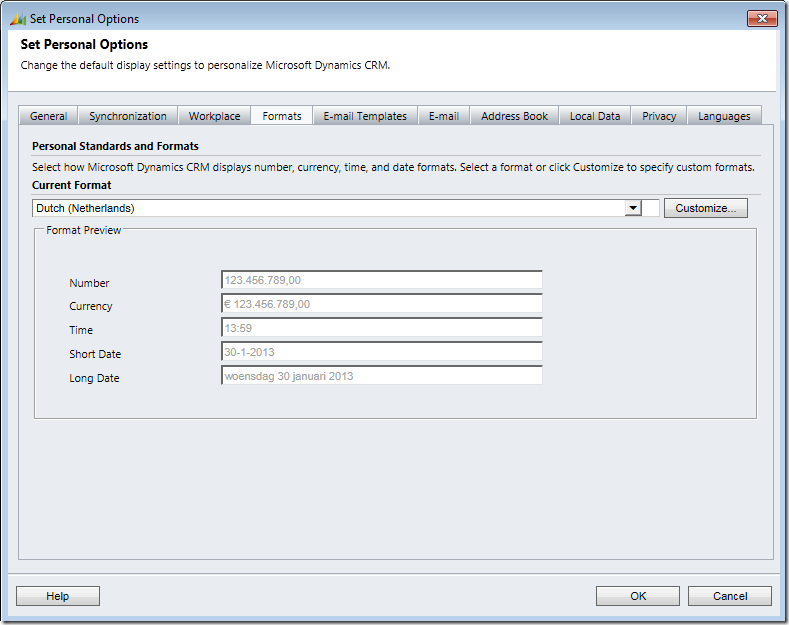
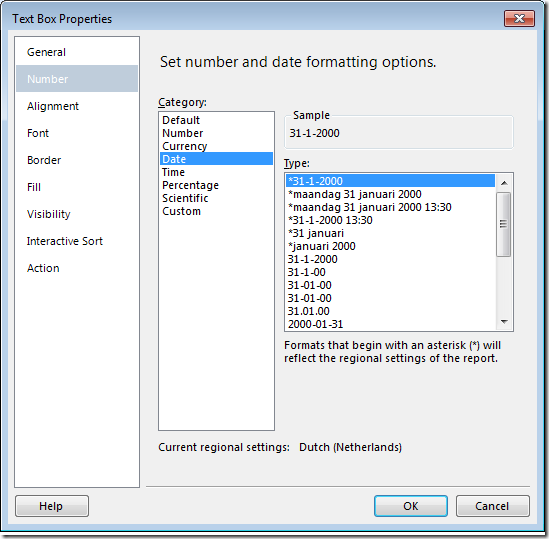
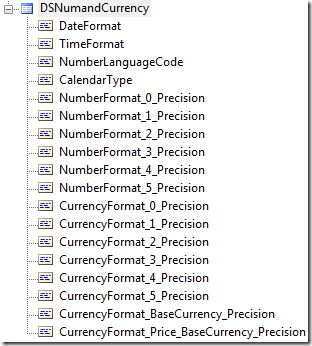

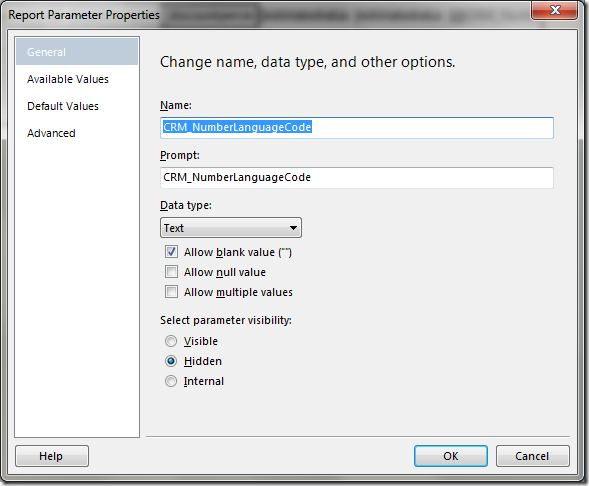
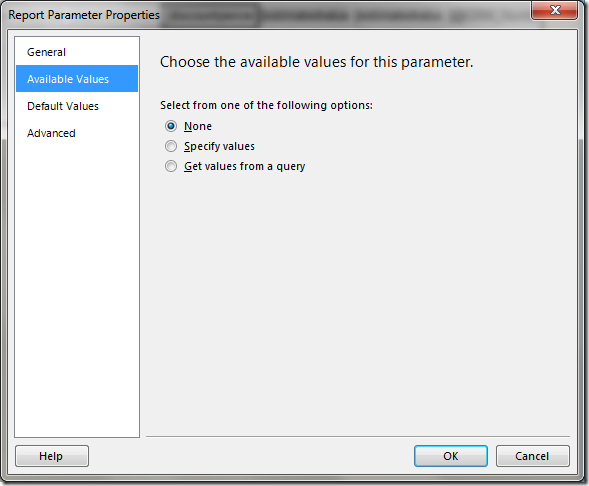
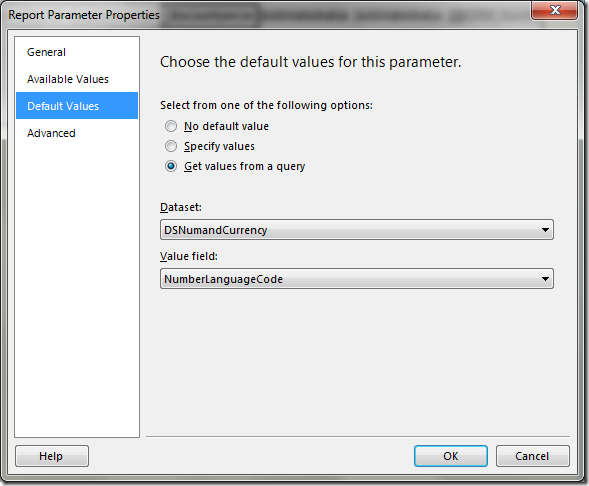


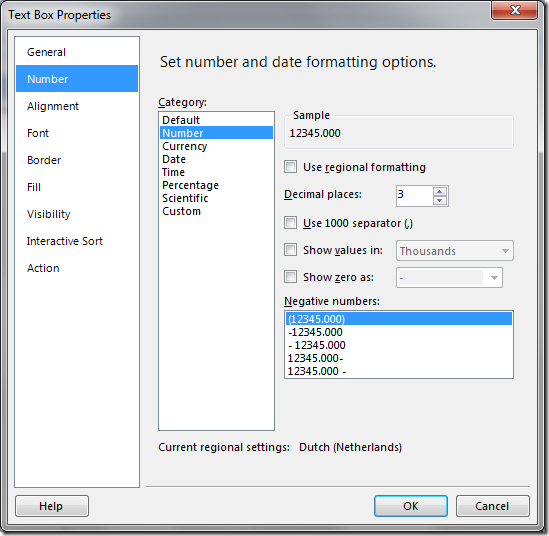
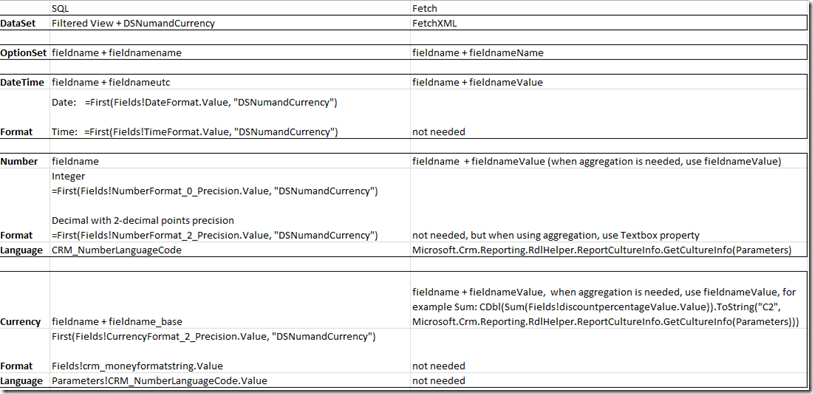



【推荐】国内首个AI IDE,深度理解中文开发场景,立即下载体验Trae
【推荐】编程新体验,更懂你的AI,立即体验豆包MarsCode编程助手
【推荐】抖音旗下AI助手豆包,你的智能百科全书,全免费不限次数
【推荐】轻量又高性能的 SSH 工具 IShell:AI 加持,快人一步
· .NET Core 中如何实现缓存的预热?
· 从 HTTP 原因短语缺失研究 HTTP/2 和 HTTP/3 的设计差异
· AI与.NET技术实操系列:向量存储与相似性搜索在 .NET 中的实现
· 基于Microsoft.Extensions.AI核心库实现RAG应用
· Linux系列:如何用heaptrack跟踪.NET程序的非托管内存泄露
· TypeScript + Deepseek 打造卜卦网站:技术与玄学的结合
· 阿里巴巴 QwQ-32B真的超越了 DeepSeek R-1吗?
· 【译】Visual Studio 中新的强大生产力特性
· 10年+ .NET Coder 心语 ── 封装的思维:从隐藏、稳定开始理解其本质意义
· 【设计模式】告别冗长if-else语句:使用策略模式优化代码结构